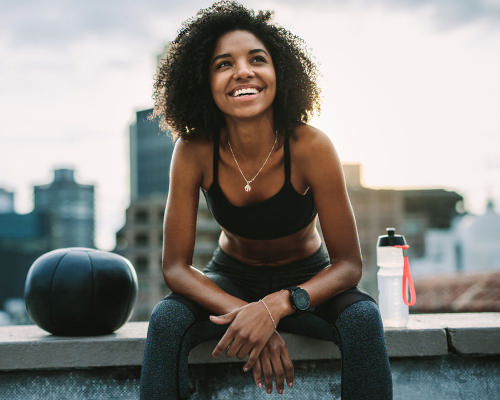Monday 06 May 2024 | Sign up for FREE magazines & ezines here
Education and career planning for the spa and wellness industry
You are here: news / industry news
You are here:
advice
Learn more >
benefits
Learn more >
stories
Learn more >
reports
Learn more >
resources
Learn more >
Spa & wellness industry news

Research finds American men exercise more for libido and sexual endurance than women
13 Dec 2023 American men are more than twice as likely as women to increase exercise frequency in order to increase libido (20 per cent vs 10 per cent,) as well as their sexual endurance (23 per cent vs 10 per cent), according to a new research report from Peloton.Peloton, conducted the online survey in September and questioned just over 4,000 Americans of different ethnicities to understand their challenges and motivators to exercise.
Ninety three per cent of those questioned said they're motivated to exercise to improve their mental health – including better sleep and mood, decreased stress, improved focus and concentration. Gen Z – which has particularly suffered with loneliness since the start of the pandemic – finds this aspect of exercise especially important.
The prospect of better physical health is still important, with 90 per cent saying this was a key motivation. Data shows that getting fit makes people feel better mentally, which in turn makes them feel better physically.
Fitness happens in multiple locations, with Peloton finding home is the most popular on average (51 per cent), followed by the gym and studios (48 per cent), outdoors (39 per cent) and sports (8 per cent), although these are cumulative results and the report says the majority of people do all of them to varying degrees.
Digging into the numbers, the report shows younger generations of US consumers are more likely to work out in gyms (58 per cent of Gen Z and 42 per cent of Millennials vs 29 per cent of Gen X and 16 per cent of Baby Boomers) or at home (45 per cent of Gen Z and 43 per cent of Millennials vs 39 per cent of Gen X and 24 per cent of Baby Boomers), while older generations are more likely to exercise outdoors (56 per cent of Baby Boomers, 49 per cent of Gen X, and 44 per cent of Millennials vs. 29 per cent of Gen Z).
Time of day relates to age when it comes to exercise, as you would expect.
Baby Boomers, many of whom are retired or part-time working – prefer 9.00am - 11.00am. Gen X choose 5.00pm to 8.00pm, Millennials before and after work – ie before 9.00am and then 5.00pm - 8.00pm and Gen Z like their lie-in, so choose 5.00pm to 8.00pm.
It seems the pandemic habit of taking a walk has endured, with 65 per cent, across all generations, reporting they incorporate walking into their routines.
More than half (54 per cent) said they feel overwhelmed by the amount of fitness information available, which can lead to confusion. The younger generations are more likely than Gen X and boomers to turn to social media (47 per cent of Gen Z; 44 per cent of Gen Y) while 36 per cent of respondents still turn to family and friends first.
Those who exercise less frequently are most likely to feel inundated.
Thirty five per cent use tech such as apps and wearables to improve their fitness. More than 40 per cent would consider using an AI-powered personalisation and biometric measurement tool.
Looking at inclusion there are positive signs and while the report acknowledges that the US fitness industry still has work to do, 88 per cent of Black/African Americans, 88 per cent of Hispanic/Latinx and 91 per cent of White Americans believe the sector is “getting more inclusive." Peloton says this is "a positive finding that brings benefit to them and their physical and mental health, their communities and to society."
Nearly six in 10 respondents (58 per cent) believe fitness companies and brands have a responsibility to address barriers to inclusiveness, a similar percentage (65 per cent) of people feel fitness brands and companies are, in fact, listening to and taking into account the opinions and needs of “people with my background,” with younger generations agreeing more (Gen Z: 71 per cent, Millennials: 78 per cent) than older generations (Gen X: 62 per cent, Baby Boomers: 50 per cent).
Among Black/African American and Hispanic/Latinx populations, 89 per cent of Black/African American and 90 per cent of Hispanic/Latinx say they're motivated by "the promise of better physical health", while 94 per cent of Black/African American and 95 per cent Hispanic/Latinx populations say they're motivated by "the promise of better mental health".
Comparatively, 90 per cent of White Americans are motivated to engage in fitness due to physical health, while 93 per cent are motivated by mental health.
Peloton published its Q3 results last month, making it three out of four misses on its most recent Earnings Per Share (EPS) targets.
The company reported a number of -11.37 per cent for trading to Sept 2023, -16.45 per cent for trading to June 2023 and -5.80 per cent for trading to Dec 2022. Peloton beat its EPS for Q2 this year, with a 21.83 per cent result.
The next Peloton earnings call with be 7 February 2024.
More industry news
Further news sources
Get your weekly ezines and FREE digital magazines – sign up here
Get the latest spa news, career opportunities and FREE digital magazines from Spa Business and Spa Business insider
© Cybertrek 2024

